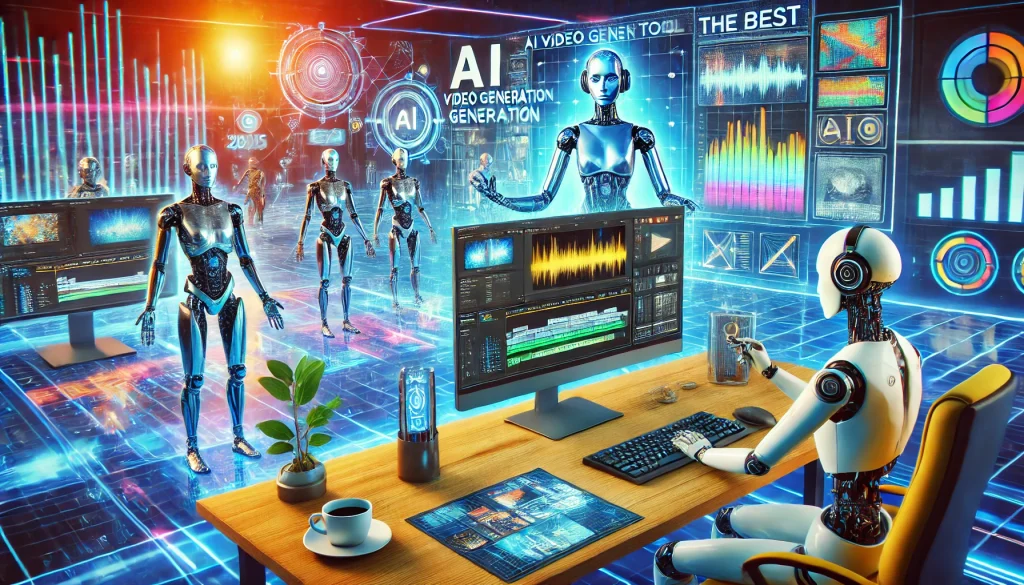
Introduction
In today’s rapidly evolving digital landscape, the question of how AI changes video production is becoming increasingly significant. As technology advances, the impact of artificial intelligence (AI) on various industries is undeniable. Video production, in particular, has seen a remarkable transformation thanks to AI. This article aims to explore the ways in which AI is revolutionizing video production, making it more efficient, creative, and accessible to digital creators around the world.
The Role of AI in Video Editing
Automating Tedious Tasks
One of the most profound impacts of AI in video production is its ability to automate repetitive and time-consuming tasks. In traditional video editing, tasks such as trimming, cropping, and organizing footage can be labor-intensive. AI-powered tools now handle these tasks with precision and speed, allowing creators to focus on more creative aspects of production.
Enhancing Creative Processes
AI is not just about automation; it also enhances creativity. With AI-driven software, editors can apply effects, transitions, and filters with ease. This technology enables creators to experiment with different styles and aesthetics, pushing the boundaries of what is possible in video production.
AI-Powered Video Analysis
Understanding Audience Preferences
AI’s ability to analyze vast amounts of data is revolutionizing how creators understand their audience. By analyzing viewer behavior and engagement, AI provides insights into what content resonates most. This information allows creators to tailor their videos to meet audience preferences, increasing engagement and viewership.
Optimizing Content for Platforms
Different platforms have unique requirements for video content. AI helps in optimizing videos for various platforms by suggesting the best formats, lengths, and styles. This ensures that content is not only engaging but also platform-appropriate, maximizing its reach.
AI-Driven Scriptwriting and Storytelling
Generating Script Ideas
AI is transforming the way scripts are written. By analyzing successful scripts and storytelling patterns, AI can generate new script ideas and suggest plot developments. This assists writers in crafting compelling narratives that captivate audiences.
Improving Storytelling Techniques
AI tools provide valuable feedback on storytelling techniques, helping creators refine their narratives. By analyzing factors such as pacing, dialogue, and character development, AI ensures that stories are engaging and well-structured.
AI in Post-Production
Enhancing Visual Effects
In post-production, AI plays a crucial role in enhancing visual effects. AI algorithms can seamlessly integrate CGI elements, remove unwanted objects, and even enhance image quality. This results in visually stunning content that captivates viewers.
Streamlining Sound Editing
Sound is a vital component of video production, and AI is making sound editing more efficient. AI-powered tools can automatically adjust audio levels, remove background noise, and synchronize audio with video. This ensures that the final product has pristine sound quality.
AI and Virtual Reality (VR)
Creating Immersive Experiences
AI’s impact extends to the realm of virtual reality (VR). By leveraging AI, creators can develop immersive VR experiences that transport viewers to different worlds. AI enhances VR by optimizing graphics, tracking user movements, and creating interactive elements.
Expanding Possibilities in VR Storytelling
In VR storytelling, AI enables creators to craft nonlinear narratives that adapt to user choices. This dynamic storytelling approach offers a unique and personalized experience for each viewer, pushing the boundaries of traditional storytelling.
Challenges and Ethical Considerations
Ensuring Ethical AI Use
While the benefits of AI in video production are clear, ethical considerations must be addressed. Issues such as data privacy, copyright, and algorithmic bias require careful attention. Creators must use AI responsibly to ensure fairness and transparency in their content.
Navigating the Learning Curve
The integration of AI in video production requires creators to adapt to new tools and workflows. While AI simplifies many tasks, there is a learning curve involved in mastering these technologies. Ongoing education and training are essential for creators to harness AI’s full potential.
Conclusion
The impact of AI on video production is transformative. By automating tasks, enhancing creativity, and providing data-driven insights, AI empowers digital creators to produce high-quality content. As AI technology continues to evolve, its role in video production will only expand, leading to even more innovative and engaging content.

FAQs
How does AI improve video editing?
AI improves video editing by automating repetitive tasks, enhancing creative processes, and providing data-driven insights.
What are the ethical considerations of using AI in video production?
Ethical considerations include data privacy, copyright issues, and algorithmic bias. It’s important to use AI responsibly.
How can AI enhance storytelling in videos?
AI enhances storytelling by generating script ideas, providing feedback on narratives, and enabling dynamic VR storytelling experiences.
For more insights on AI in digital creation, visit AI Video Generators, Text-to-Video AI, and AI Video Generator Explained. Also, explore external resources like AI Graphic Design Tools for broader AI applications.






